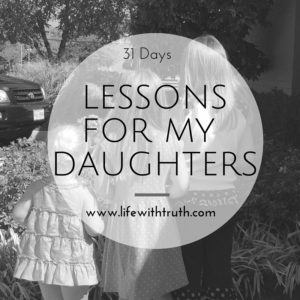
Day 6 :: A Mother’s love multiplies
“Mommy, who do you love more?”
Isabella, my almost seven year old hesitantly asked me this question a couple months ago. I was pretty sure she meant which of my children did I love more, so I probed for more information. Sure enough, she was feeling a little bit insecure and wondering how it would be possible for me to love each of my children equally.
The interesting part about this was that in our conversation she brought up the Bible.
“But Mommy, there are people in the Bible who loved some of their children more than others.”
“Oh, you mean like the way Jacob loved Joseph?”, I asked.
“And Isaac. Didn’t he love one of his sons more?”
First of all, I was impressed with the fact that she could recount these specific examples from Scripture. She must be paying attention (praise the Lord!!).
Secondly, I loved that she came to me with her insecurities and struck up a conversation. It was obvious to me that this had been on her mind for awhile, so it also made me sad that she had struggled with something so important as my love for her.
I shared with her that people in the Bible didn’t always make wise choices. It wasn’t right for Isaac and Jacob to show more love to one son than another. And even though God used their sons to write the story of Redemption, it doesn’t mean that we should follow their example.
How do you explain to your children the multiplication, not division, of love?
A child’s love for things is most likely divided. A certain toy is favored more than others. They choose a best friend and want to spend more time with that person. They love chocolate ice cream more than strawberry. So, when a child thinks about being loved, it’s most likely within this framework of preferences.
I remember finding out I was pregnant with our second child and wondering how I could ever love another child as much as I loved my first. Most parents with one child have these same thoughts. But then you give birth to the next one, and instantly realize that your love has grown, not diminished or separated. You love both people (and any additional children who come along) with the same love. And I might even go so far as to say that your love for each one of them continues to increase.
I tried to assure Isabella that I loved all four of them equally, and our fifth baby would receive the same amount of love. We talked about how each one of them is different. They enjoy different activities. They have different issues that require discipline. They sometimes require more attention than another.
But just because our children are different doesn’t mean that our love for them is different.
I explained to her that sometimes I would mess up. I might hurt her feelings or fail to demonstrate love to her in the way that I should. We talked about God’s grace, even in that, and the fact that our ability to love comes from Him.
And then I told her that God’s love for her is perfect. He will never fail to keep His promises. His love is everlasting. And so when I mess up and she doesn’t feel loved for whatever reason, she can rest assured that God’s love will never mess up.
It boils down to trust.
My children have to believe that when I say I love them, it’s true.
And I need to consistently demonstrate love to them so that they feel secure and confident in my love.
I want my daughters (and son) to know that I love them. Unconditionally. Equally. Deeply. Imperfectly, yes. But I will always love them and my love for them will only ever grow, it will never diminish.
This is Day 6 in a series “Lessons for my Daughters”. Click here for a complete list of posts.


3 Comments
sherri lynn
I can’t imagine loving another child like I love Madeleine! But I’m glad to know that a mother’s love multiplies! I love that Isabella brought this conversation up. She is definitely a thinker!
Pingback:
Pingback: